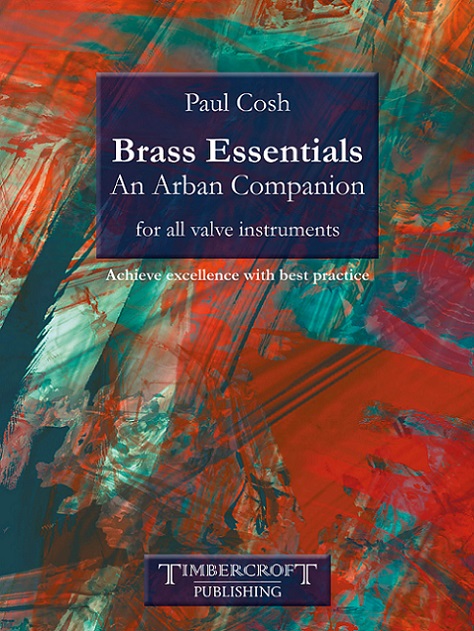

Paul Cosh has long been regarded as the ‘go to’ clinician for brass players experiencing short terms niggles as well as inherent longer term problems with their playing.
A trumpet player with the BBC Symphony Orchestra from 1987 to 2005 and Professor at the Guildhall School of Music & Drama for over 35 years, his performing and academic backgrounds have also embraced a lifelong commitment to brass bands – as a player, conductor, adjudicator and teacher.
The list of those he has helped is like a ‘who’s who’ of the professional and amateur brass world, as the commendations on the back cover of the publication richly endorse.
Mechanics
As he clearly sets out in the foreword to this ‘companion’ to the iconic Arban ‘Bible’, his teaching does not in any way try to reinvent the mechanics of brass playing – but simply explains the understanding to how they should work perfectly.
Given that his own teacher at the Royal Academy of Music was the great William Overton, who in his time was also the most sought-after teacher in the business – it’s an insistence that needs to be imprinted on the mind.
As he clearly sets out in the foreword to this ‘companion’ to the iconic Arban ‘Bible’, his teaching does not in any way try to reinvent the mechanics of brass playing – but simply explains the understanding to how they should work perfectly.
“The overriding principle,” he writes, “…is to accept no errors in the technical requirements, maintaining a good sound and intonation throughout by always using a well-supported airflow. There is an insistence that each note has a value and should be cherished. Accept no discrepancies in rhythm and sound quality.”
Crucial explanation
Split into 11 parts, he lucidly provides a deceptively simple, yet crucial explanation of the purpose to the Arban exercises that aim to “achieve excellence with best practice”.
Sequential and focussed, it strips the needless complexities of the purity of brass playing back to its bare bones to provide the skeletal template on which the meaty substance of high-quality playing must be based: Consider, perform, repeat.
Sequential and focussed, it strips the needless complexities of the purity of brass playing back to its bare bones to provide the skeletal template on which the meaty substance of high-quality playing must be based: Consider, perform, repeat.
Set-up, Articulation and Sound is followed by Light Articulation; Syncopation, Spacing and Rhythm; Single Tonguing; Controlled Slurring Technique; Running Scales and Chromatics; Breathing, Shaping and Phrasing; Arpeggios, Dominant Sevenths and Diminished Sevenths; Triple Tonguing; and Double Tonguing.
The book concludes with five of the famous Arban Studies – each selected to reinforce that which has gone before, and set out as simply and as clearly as the excellent quality of the crisp publication print from Timbercroft Publishing.
If you are serious about your development as a brass player, this companion really is essential to your best practice needs.
Iwan Fox
To purchase:
https://4barsrest.shop/product/brass-essentials-an-arban-companion/









